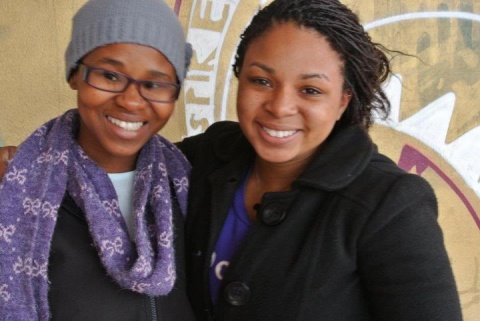
Every once in a while someone comes along into your life that forces you to examine your own, examine the way you relate to other people, the way you pay it forward, the way you appreciate every little thing that comes your way. Unathi is one of those people. She started as a volunteer in 2009 at the Makhaza branch and very quickly integrated herself into every little inch of everything we do, a walking embodiment of all the values we as Ikamvanites hold in our hearts and try live by every day.
So quickly did she become part of the branch and as the head of two programs, we never thought of the possibility of ever losing her to the corportate world!

Unathi and Torie
“My name is Unathi Smile, joined Ikamva Youth in 2009 as a volunteer. The main subjects I tutored were Maths, Accounting, Business Economics and Economics. I started tutoring the younger grades especially the grade 10s. I matriculated in 2006 from Harry Gwala Secondary; in 2010 I graduated in ND: Management at the Cape Peninsula University of Technology. In 2012 I graduated in Btech: Quality from the same institution. In between studying, I maintained volunteering at Ikamva and I tutored the older grades. In 2011 I tutored intensely which resulted in me becoming a coach in a computer program called Khan Academy. This did not end there I became the director of the Khan Academy program.
Capitec Bank hosted Competency Tests during the March school holidays to help IkamvaYouth develop a benchmark for which we can compare results, which I also took part in. In a matter of 3 weeks I received a phone call from the bank for an interview. Right after the interview I waited for full two weeks and heard the news I have wanted to hear, I had passed the interview!
The experience I have gained from working with the kids and the knowledge I have gained from studying for 5 years made me the leader I am today.”
So today is Unathi’s first day at her new job! And while we are very sad at Makhaza not to have her around everyday, this is the whole reason why we do what we do – people paying it forward in their lives, pulling themselves and each other out of povery. Unathi we know you will be a HUGE success at Capitec, and they will love you as much as we do!
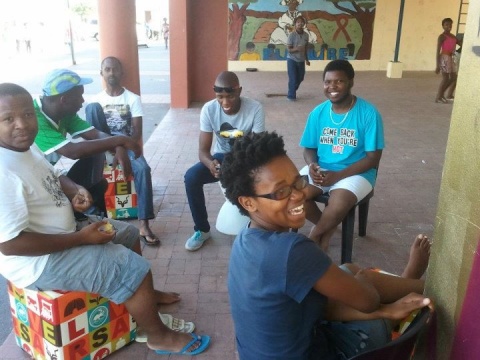
Chilling with the boys
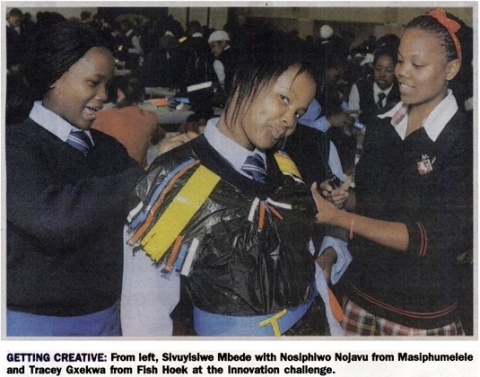
12 Makhazanites, 9 Masinites and 4 Nyanganites have been enrolled with the Young South African Innovator Challenge organised by HIP2BE2, 3M and the Western Cape Education Department.
This Challenge will see learners competing for the title of Innovator of the Year and the opportunity to develop and market their innovation with the help of 3M.

Please have a read through the attached article.
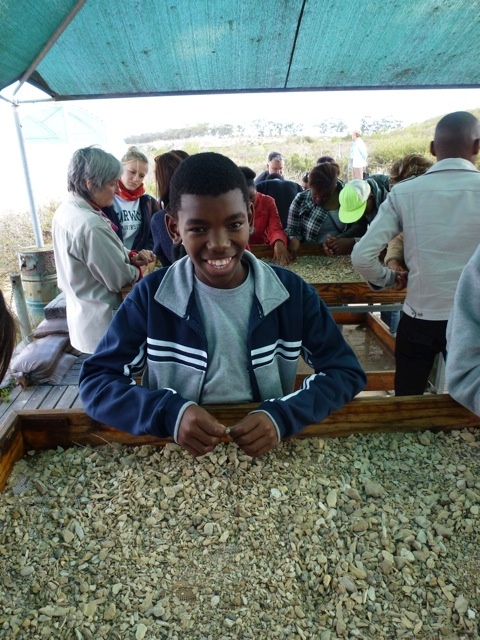
“These trips made realise how broad the study of nature is”
Afika Mabali, Grade 9
Makhaza has the incredible fortune of having some amazing workshop partners who take our learners all over the province. One such person is Dr. Carl Palmer who throughout his long history in association with Makhaza opened up spaces on various trips around the province, along with students from the ACCESS (Applied Centre for Climatic &Earth Systems Science) programmes.
Two trips this term saw 10 students make their way to the Fossil Park near Langebaan, a place of well-preserved remains of fossil fauna that date to circa 5.2 million years ago and include bones of over 200 different animal species. This trip was a time for our leaner representatives to bond, Luxhase, our Grade 8 rep said “I really enjoyed myself. It was so much fun, I didn’t know much about the history of Fossil Park but trust me now I can tell a lot about it. I am still surprised about the existence of bones on earth. I wouldn’t mind to going there again!”, while Siphokazi, one of Grade 9 reps said “I was so excited about the trip, the most fascinating part for me was the existence of bones for so many years. I cannot believe it, 5 million years ago but we can still see them and identify what they are! Another thing I enjoyed was the beach, even though the winter has started in Cape Town, I never get a chance to go to the beach. Thank You Carl!!”

The second trip was for 10 of the best attending and most improved grade 8 & 9s who met bright and early at the cable car for a long walk up Table Mountain. Phiwe Maliti one of the grade 8 learner said, “The Table mountain trip was fun, I climbed the mountain for the first time in my entire life. Even though it was hard to climb I eventually reached the top! “
Noluntu Marenene said, “I enjoyed the climbing of the mountain. I learnt that when you climb the mountain, the body temperature increases. Also I didn’t know that there are animals that live in Table Mountain such as snakes. The most exciting part was finally reaching the top, it was a great accomplishment. I would love to go there again. Thanks so much!!”
Big Thanks to Dr Carl Palmer and the ACCESS program for their continued support for our Makhaza branch
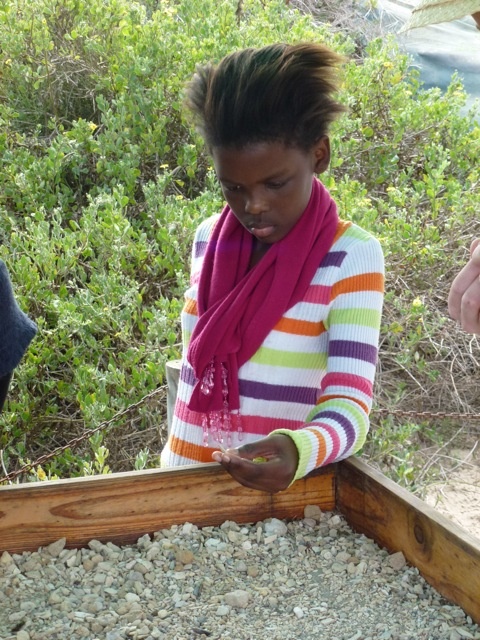
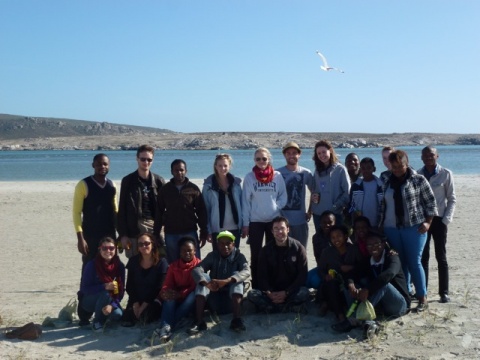
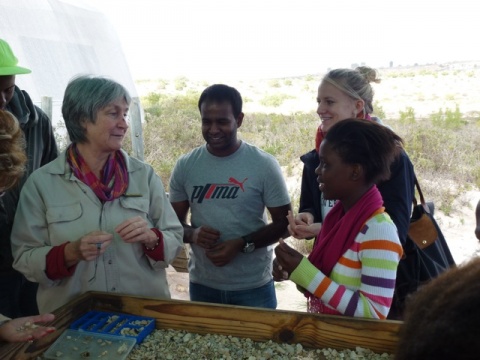
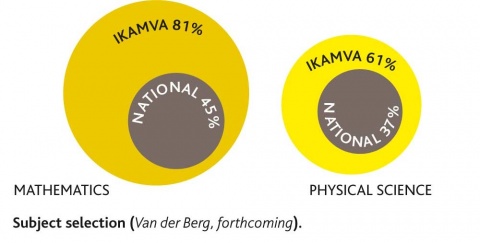
IkamvaYouth is pleased and proud to announce the publication of Against the odds: An evaluation of the IkamvaYouth programme, by a team of economists at the University of Stellenbosch. Servaas van der Berg and his team conducted an in-depth evaluation of IkamvaYouth, by administering questionnaires and interviewing 828 ikamvanites (past and present).
The full report is available here for download, and contains a wealth of information, results, analysis, quotes from ikamvanites and recommendations for improvements and scale.
Some of the findings have validated the results we’ve reported via our own tracking (see below). However, there were also some new and interesting findings, including:
- Insight into ikamvanites’ wealth and living standards
- Only 38% of ikamvanites live with their parents; 45% sometimes go to bed hungry; only 31% have their own desk or table at home and 65% have their own bed.
- 22% of mothers have matric and 11% have some post schooling
- 15% of fathers have matric and 9% have some post schooling; 32% of fathers’ education levels are unknown
- Matric results as compared with those of our feeder schools
- Detail regarding learners’ choosing Maths and Science and their performance in these most-challenging subjects
- “An overwhelming majority (81%) of Ikamva students in 2011 elected to do Mathematics, versus less than half of all candidates nationally. For Physical Science too, far more Ikamvanites chose this difficult option. Reponses to the survey indicate that similarly high proportion of former Ikamva students had elected these two subjects: 78% wrote Mathematics and 54% Physical Science.”
- “The difficulty of these subjects can be gauged from the fact that nationally, the pass rate (at 30%) is 46% and 53% for these two subjects respectively, much lower than for other electives such as Geography (70%) or History (76%), despite the fact that the candidates in these first two subjects are a far more select group in terms of academic ability. This ambitious subject choice is even more exceptional when compared to learners from similar (mainly township) schools. Ikamva’s encouragement of learners to take these more difficult subjects necessarily affects the relative pass rates and the subject performance of Ikamva learners negatively, thus the need to carefully consider this when evaluating Ikamva learners’ results.”
- “61% of all Ikamva matric candidates wrote and passed Mathematics, as against only 21% for all South African matric candidates.3 The proportion of all Ikamva matric candidates who achieved 40% or more was 28% versus 14% for all South African candidates. Compared to similar communities the Ikamva performance in this regard would even be more impressive than this.”
- ” What Ikamva thus successfully manages to do is to encourage learners from across the ability spectrum to raise the bar, by entering for subjects which the typical student from weak schools would usually avoid, and then to achieve success which is at least comparable to that achieved by candidates that often are more selected in terms of ability and from higher socio-economic groups. This is a truly impressive achievement.”
- The good results are consistent: “average results differ little between branches”
- The programme is very highly regarded by our learners and ex-learners (they do tell us these things, but it means a great deal more when told to independent evaluators)
- “The evaluation team is confident that Ikamva’s short term impact is considerable. This lies not only in the improved matric performance, but even before that in helping to create an environment where children from often very disadvantaged circumstances feel a sense of belonging and that someone cares about their needs and ambitions. That alone is a very valuable contribution. The extent of this contribution cannot be measured, but is visible in the fact that Ikamva was so highly praised by all who participates in it, or have done so in the past. As an evaluation team we have not seen such universally high praise of an organisation before.”
- Insight into the “success factors” behind the IY model
- “The remarkably successful personal relationships that Ikamva has developed with participants, based on extremely sensitive interaction with learners, yet without undermining basic discipline: “Kickouts” still occur and learners know that they can only remain part of the “family” if they play their part.”
- The tutors: “They are largely volunteers and mostly young. The fact that many of them are former Ikamvanites say something about the glue that holds Ikamva together: A positive social context in an environment where many face harsh circumstances at home, in the labour market, schools, universities, and wider society. The link with Ikamva means much to them, and also provides some continuity in their lives. Also, they act as role models to learners, thus further strengthening the desire of learners to undertake tertiary studies. Their relative youth also means that communication with learners is easier, in contrast to what learners experience at school. The team found no evidence that the tutors were particularly well trained or that they were always much better teachers than those in schools; the commitment, positive interaction and additional time were apparently most important in the success of students, not the better teaching.”
- “The fact that Ikamva operates in metropolitan environments where there are universities close by is an important factor in its success. Without a strong volunteer base, the tutors would not have been available, and it would have been more difficult to build the passion for tertiary studies that drives many Ikamvanites.”
- “The most important factors in Ikamva’s success, however, appear to be its commendable organisation, good planning and the enthusiasm of those at the head of the organisation. This enthusiasm is contagious.”
- Matric results
- “85% of Ikamva candidates passed, against the 70% nationally, or put differently, that Ikamva’s failure rate of 15% was half of the national average. But the full extent of Ikamva’s performance success is not yet captured in simple pass or fail rates: What is quite impressive is Ikamva’s performance in terms of getting learners access to universities: 36% of Ikamva candidates, versus 24% nationally, obtained a so-called “Bachelor’s degree endorsement”, i.e. a pass that is considered by the Department of Basic Education as good enough for degree studies. This is what used to be referred to in the past as “university exemption”. Data on a race basis is not yet available for 2011, but to put the Ikamva performance in terms of potential university entry in perspective, it is worth considering that the proportion of black students who obtained such exemptions in 2007, the last year for which race data could be obtained, was only around 11%. Altogether 72% of Ikamva candidates passed with either Bachelor’s or a Diploma endorsement, i.e. could potentially attend a university for degree or diploma studies (some universities have stricter entry criteria, though), whilst this proportion is only 53% amongst matric candidates nationally.”
- Placement into post-school opportunities
- More than half of respondents who had matriculated whilst participating in Ikamva after matriculating (58% of the 119 such respondents in the survey) indicated that they had gone onto university studies, and another 14% that they had continued onto “college” (here interpreted fairly broadly as other post-school studies). This thus left only 28% who had not gone on to further studies.
Key recommendations which we’re currently considering carefully include:
- Find ways to support learners as they adjust to life at tertiary
- “Ikamva could, and should, find ways of assisting students to make the transition to university, both by assistance with the initial exposure to academic English that many respondents to the qualitative interviews found daunting, and by helping them to find support structures to reduce the anomy that they experience when starting at university. Ikamva would have to decide how much of this it wants to engage in itself (which is not its core activity), and how much can be done by assisting Ikamvanites to link to other institutions (e.g. NGOs and university structures) that could assist.”
- Provide more support to build proficiency in Academic English
- Scale cautiously:
-
“Given how important Ikamva’s leadership is in its success, one may well argue that it would be extremely difficult to scale up the activities, particularly across many more centres. The evaluation team has indeed expressed its reservations about that in previous interaction with Ikamva: It is easy for leadership to under-estimate the importance of its own role. A dilution of this leadership across a much bigger organisation may lead to the programme losing some its attractiveness to students. On the other hand, analysis shows little difference in performance between branches. This could be interpreted as that the success lies in the model, and not in the particular leadership at branch level. This would be consistent with a view that expansion could be attempted as long as good branch leadership can be found. A cautious approach may be to consider expansion only when there are good support structures and where good branch managers are available, but not to be over-ambitious. The strong central leadership capacity that Ikamva possesses for planning and organisation is an asset that could be built on and that may offer a solid foundation for expansion, but it should not be endangered by too rapid expansion. Also, expansion should retain the essentials of the existing model, which importantly includes proximity to a university environment, preferably in a metropolitan area. This limits scalability, but such a conservative stance may be appropriate.”
IkamvaYouth is greatly appreciative to the Evaluation team (Nic Spaull, Ronelle Burger, Cobus Burger, Chris van Wyk, Servaas van der Berg, Robert Dzivakwi and the fieldworkers), ikamvanite Phillip Mcelu for tracking down 95% of all ikamvanites (!), DGMT for making this possible, and to all the ikamvanites who participated in the survey and interviews.

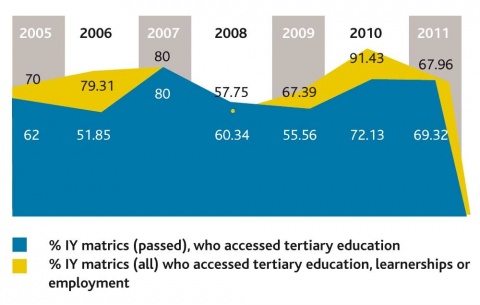
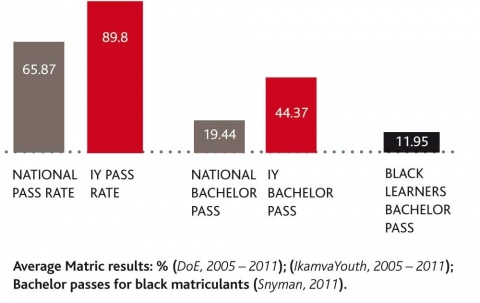
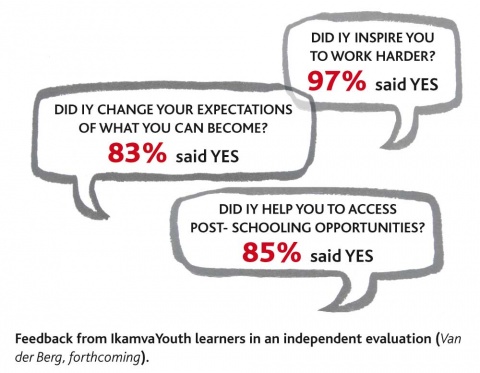
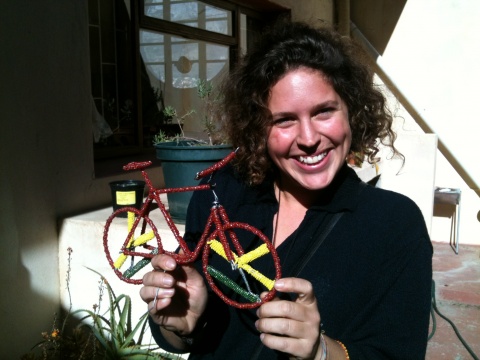
IkamvaYouth has some great stories about how ikamvanites become core staff members. Did you know that Nico ended up randomly at Makhaza one Saturday morning following a suggestion from the person whose couch he was surfing? Four years later, and he’s established the Masi branch and doesn’t seem to be making any plans to return to France any time soon (holding thumbs!)
Zoe Mann floated into IY on a cloud ready for a few months of interning, and two years later, she’s finally decided to get on her bicycle (literally!) and continue exploring the country after being all-consumed at the Masi branch and playing a key role as a project manager for natcom. 
Ikamvanites from across the country have sent heartfelt goodbyes. On Saturday, Zoe said, “this is my last day at IkamvaYouth. I just wanted to say thank you so much for your involvement with Ikamva. It is an organisation I strongly believe in and will continue to support it in anyway I can from wherever I may be. It is the volunteers, as well as the learners and staff, that have made my time here absolutely incredible. I have learnt so much from every single person I have met here and I truly respect what Ikamva and yourselves are contributing to this world. Thank you for being part of my life and IkamvaYouth’s life.”
Nico wrote “Zoe, you really made a difference at the IY branch and also within the community. You inspired me with your eagerness of doing things right and so creatively. I am very happy for having worked with you from July 2010 and will always be pleased to know you will be around IY even when you will be studying. As the US Marines and the Boys & Girls Scouts, we saay “Ikamvanite today, Ikamvanite forever”… I wish you Fair and inspirational winds, Sis.”
Zoe, your contribution has been awesome; your fun, can-do attitude is infectious and you’ll be sorely missed by all of us! The other IY branches are hoping to see you riding up to visit on your flashy red bike 🙂
PS A big shout-out of thanks goes to Jullard Creations who created this beautiful bike, which Zoe can put on her desk when she next has to sit behind one ;-). Juma and Willard have been friends of IkamvaYouth since the 2008 xenophobic attacks when they spent some time staying in the Desmond Tutu Hall adjoining the Makhaza office.
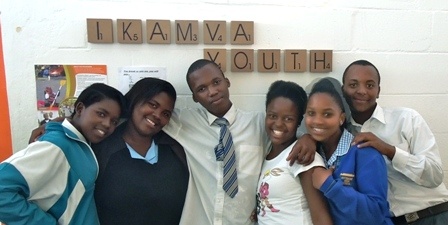
Makhaza students were abuzz last week with excitment and creativity when they got the chance to create a music video for the Adobe Youth Voices Aspire Awards. (VOTE TODAY!) This program is designed to provide youth in underserved communities with the critical skills they need to become active and engaged members of their communities and the world at large. By engaging these young people in exciting and meaningful new ways it provides a platform for them to communicate their concerns, aspirations, and vision using modern communications skills in telling stories that make a real impact.

Shelley Smith, a UCT masters student who facilitated the project for us and has this to say:
“It has truly been such a joy and inspiration to work with the group of IkamvaYouth participants involved in the Adobe Youth Aspire Awards project. I feel honoured to have had the opportunity to get to know such intelligent, creative, innovative, and passionate people; From them I have learned so much and am inspired to do so much more. The participants were given the task of creating a multimedia project which addressed critical issues and provided solutions for positive change. They chose to produce a music video combining mixed beats, acting, rap, poetry and song all student-created, filmed, and edited. The participants were given a very short amount of time to develop and execute the project and they did so with positively soaring colours.
What was beautiful to witness was the profound importance of the project to the participants and the pride they took in their work, not just because it was a fun music video, but because of the message they were communicating to their peers and to the world through a medium that showcased their individual talents and gifts. Their video addressed the crucial importance of education and how, no matter what obstacles one faces or peer pressure one encounters, he or she must keep working hard, believe in himself, never give up on his dreams; As the video states, this is the way to ‘drive poverty away.’ The video highlight Ikamva Youth as a vessel that strengthens them both academically and emotionally and is a necessity for them if they are to succeed in achieving their goals.

My role in the project was to guide the participants in the whole process and keep a structure in place; structure for the actual music video as well as timing structure of the steps needed to create, shoot, and edit the project to meet Adobe’s deadline. Given my background in broadcast journalism, I also ran a videography and editing workshop with the three IkamvaYouth members who served as the ‘camera crew’ and the main editor. I was blown away at how quickly the ‘media team’ picked up on the tips and skills I had to share with them and how eager they were to learn and get into the meat of the work – Made my job as teacher very easy! 🙂
Aside from the brilliant talent the members brought to the table, their teamwork, respect for one another, and communal effort to make the video the best it could be was truly amazing. I’ve so loved the time spent with each of them; many laughs, many jokes, many memories to be treasured. I cannot wait to see where these all-stars go and hope to continue working with Ikamva in the months to come. Great job everyone! 🙂 “
Check out the video here!
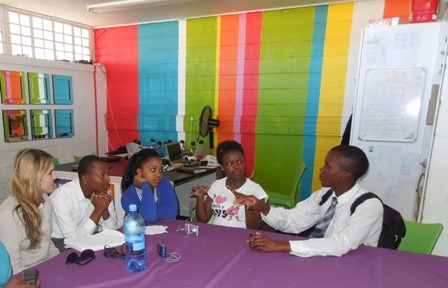
Big up Shelley, We love you!

















 Lloyd Lungu
Lloyd Lungu